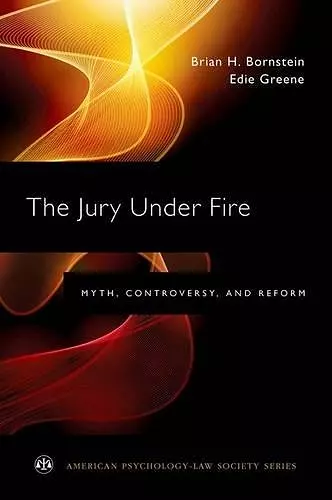The Jury Under Fire
Myth, Controversy, and Reform
Brian H Bornstein author Edie Greene author
Format:Paperback
Publisher:Oxford University Press Inc
Published:9th Mar '17
Currently unavailable, and unfortunately no date known when it will be back

Winner of the 2019 APLS Book Award
The Jury Under Fire reviews a number of controversial beliefs about juries that have persisted in recent years as well as the implications of these views for jury reform efforts. Each chapter focuses on a mistaken assumption or myth about jurors or juries, critiques the myth, and then uses social science research findings to suggest appropriate reforms.Although the jury is often referred to as one of the bulwarks of the American justice system, it regularly comes under attack. Recent changes to trial procedures, such as reducing jury size, allowing non-unanimous verdicts, and rewriting jury instructions in plain English, were designed to promote greater efficiency and adherence to the law. Other changes, such as capping damages and replacing jurors with judges as arbiters in complex trials, seem designed to restrict the role of laypeople in trial outcomes. Whether these innovations are implemented to facilitate the administration of justice or due to the belief that juries have excessive power and make irrational decisions, they raise a host of questions about their effects on juries' judgments and about justice. Policymakers sometimes make incorrect assumptions about jury behavior, with the result that some reform efforts have had surprising and unintended consequences. The Jury Under Fire reviews a number of controversial beliefs about juries as well as the implications of these views for jury reform. It reviews up-to-date research on both criminal and civil juries that uses a variety of research methodologies: simulations, archival analyses, field studies, and juror interviews. Each chapter focuses on a mistaken assumption or myth about jurors or juries, critiques these myths, and then uses social science research findings to suggest appropriate reforms. Chapters discuss the experience of serving as a juror; jury selection and jury size; and the impact of evidence from eyewitnesses, experts, confessions, and juvenile offenders. The book also covers the process of deciding damages and punishment and the role of emotions in jurors' decision making, and it compares jurors' and judges' decisions. Finally, it reviews a broad range of efforts to reform the jury, including the most promising reforms that have a solid backing in research. Featuring highly visible trials to illustrate key points, The Jury Under Fire will interest researchers in psychology and the law, practicing attorneys, and policymakers, as well as students and trainees in these areas.
"Bornstein and Greene debunk more than a dozen popular myths-which often double as legal assumptions-about juries and how they function, interweaving descriptions of notable jury trials with scientific research testing whether these assumptions have merit. Engaging in style and thoroughly researched, this book is a 'must read' for anyone with an interest in jury decision making and is sure to become required reading in any class examining the jury."--Margaret Bull Kovera, PhD, Presidential Scholar and Professor of Psychology, John Jay College, City University of New York "This book is a welcome addition to the field. The authors use the most up-to-date findings to critically evaluate several myths about jury decision making. The chapters are presented in a fair and unbiased manner, making for an exceptionally clever and well-thought out book. This book adds something original to the field and will be a tremendous benefit for social scientists interested in juries and jury decision making."--Jeffrey Neuschatz, PhD, Professor and Chair, Department of Psychology, University of Alabama in Huntsville "The book skillfully interweaves cogent summaries of legal principles or important forensic issues, such as the psychology of eyewitness accuracy or false confession, with research into how juries grapple with these topics." --PsycCRITIQUES
ISBN: 9780190201340
Dimensions: 234mm x 155mm x 23mm
Weight: 590g
418 pages